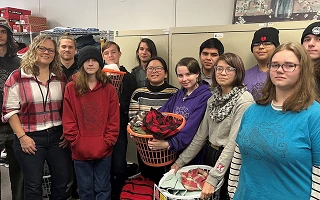Our youth can access worldwide social connections...this can put some in great danger. Parents monitoring a teen's access to the worldwide web must realize it is truly a safety issue, not a parental control issue.
Teens are out of school for summer break and have more free time. And a large portion of that time will be spent online.
“Our youth have immediate access to worldwide social connections. As parents, we have to realize the window of danger open to them. It’s important to have conversations with your teen and to set rules about internet use,” said Diane DeLong, North Star senior program manager. “Tell them to not feel pressured by others to do something that makes them uncomfortable. It’s important that they also understand this is truly a safety issue, not a parental control issue.”
Share the following tips with your teens to keep them safe online.
1.Keep personal information private
Never share things like home addresses, telephone numbers, age or birthdate. If somebody you meet online asks for personal information, stop talking to them and tell your parents. They could be a predator.
2.Never meet someone you don’t already know
Even if someone appears to be a teenager, don’t meet up with them. If somebody online is pressuring you to meet in person, tell your parents immediately.
3.Never fill out questionnaires that are sent to you online
Online questionnaires are often ploys to steal personal information. No matter how fun or trendy they might seem, don’t participate, even if they are sent from a friend.
4.Be careful who you add to your friend list
Don’t add anyone to your friend list who you don’t already know. If someone you don’t know keeps sending you friend requests or private messages, simply block their account.
5.Nothing on the Internet is truly private
Once a picture or a post is sent on the Internet, it stays on the Internet. The same is true for Snap Chat and other apps.
6.Be careful when posting pictures
Just because everyone post pictures online doesn’t mean it’s a good idea. If you must post a picture of yourself, make sure it is tasteful. You don’t want to post a photo that you will regret sharing later, especially if your parents or teachers wouldn’t approve. The same goes for posting pictures of your friends.
7.Don’t download anything without your parent’s permission
Be careful what you download. Some files can install viruses that invade your privacy or destroy your computer.
8.Keep your passwords private
Passwords are the main way of keeping yourself safe online. Never share your passwords with anyone except your parents.
Technology opens up a lot of possibilities. You don’t need to be afraid of the Internet if you follow these rules.
Teens won’t be spending all of their time online so check out the rest of our tips for keeping teens safe.








